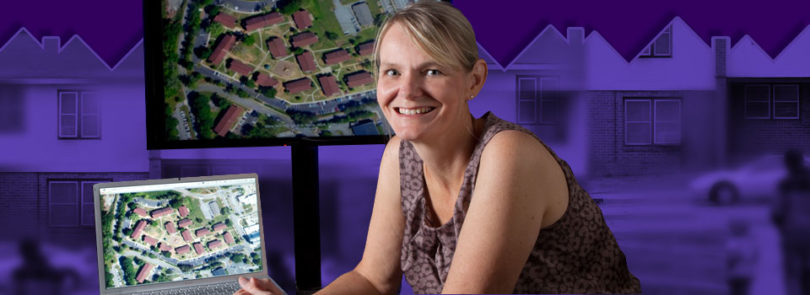This past spring, Kimberly Skobba took her students to a part of Athens that most of them had never driven by, much less visited. The service-learning class became proficient in the assistant professor’s favorite research technique-interviewing-through talking to the residents of the Jack R. Wells Homes, located just off Hawthorne Avenue in west Athens.
The Athens Housing Authority started demolition on the public housing complex, more commonly known as Pauldoe, earlier this year. A mixed-income development will be built in its place.
Before the neighborhood was stripped down to its foundations, Skobba wanted to make sure the people living there-and their stories-would be remembered.
“The students interviewed the residents, focusing on how they felt about living there and then about moving,” said Skobba, who works in the College of Family and Consumer Sciences’ department of housing and consumer economics.
Some of the residents had lived in Jack R. Wells for decades. The last housing manager to walk the grounds grew up playing among the buildings and came back as an adult to live and work in the community.
For Skobba, the project wasn’t something that originated when she was named a service-learning fellow at UGA for the 2012-2013 academic year. Housing studies is her passion.
“I’ve always been interested in where people live and neighborhood demographics,” she said, “especially why people in low-income households move so often and what they do or do not accomplish by moving.”
The technical terms for what she studies are chronic mobility and serial inadequacy. She’s most interested in chronic mobility-individuals or families who move every few months-especially when it comes to families with children.
“I’m really lucky to have found something that I’m so passionate about,” she said.
Skobba received her bachelor’s degree in communications from Augsburg College in Minneapolis in 1997. A few years working in public relations left her desiring more out of a career, and she headed to the University of Minnesota to earn her master’s degree in design, housing and apparel with a housing studies emphasis, which she finished in 2002.
Skobba worked in the nonprofit housing field for about 15 years, starting a consulting business in the last five of those years.
In 2008, Skobba finished her doctorate, again at the University of Minnesota. Her focus was housing studies with a minor in family policy, and her research centered on the influence of Section 8 vouchers on the housing careers of working poor families.
“The policy direction now is going away from helping people in public housing,” she said. “I’m very interested in the community that forms in low-income communities, the idea that if you don’t have financial resources, people become your form of capital.”
After a few more years consulting, Skobba realized she missed academics, academic research and teaching. So she packed up her family and moved from Minneapolis to Athens.
With her yearlong service-learning fellowship finished and a summer session course in London behind her, she’s looking forward to writing more research articles and book chapters-she recently had two published; two others have been accepted for publication, and three are in various stages of submission. She’s also working on a book with the University of Minnesota’s Ed Goetz about the long-term housing experiences of low-income families.
In all of Skobba’s classes, she relies on small-group discussion and case studies as her major teaching tool. And she’s working to incorporate more service-learning aspects into each of her courses.
“I’m a real believer in that students learn best by doing,” she said.
As for the students who spent their spring semester learning Skobba’s favorite research technique interviewing Pauldoe residents-they’re waiting on the results of their hands-on work.
“We’re writing a book or booklet that includes their interviews,” she said. She can’t wait to pass on a little piece of history to her students and, more importantly, the residents who made Jack R. Wells their home.



